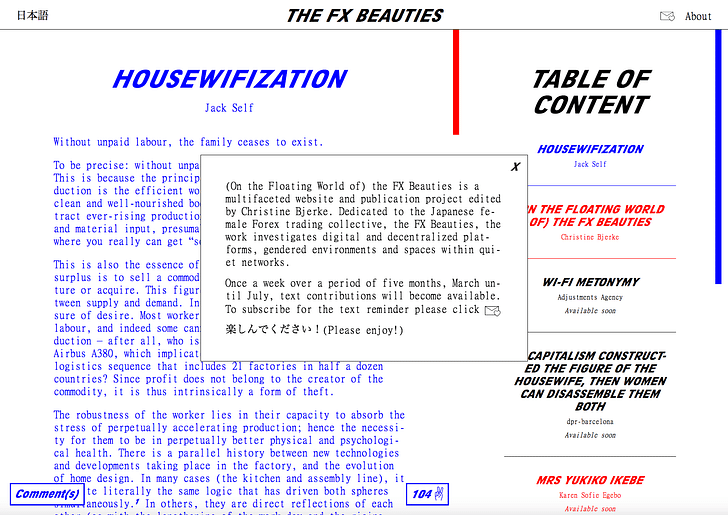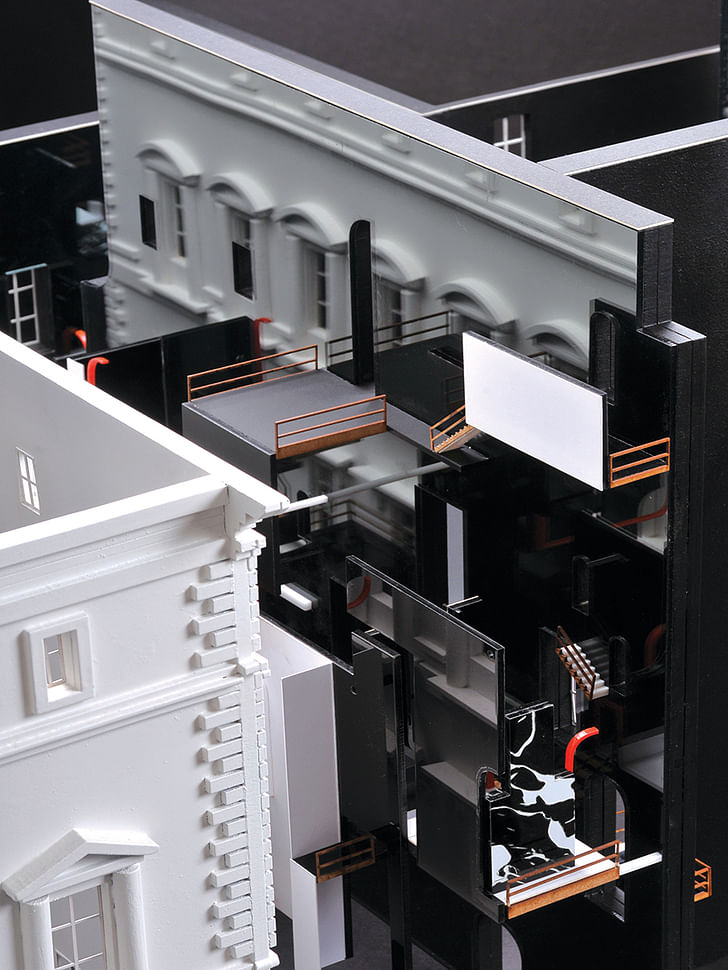

“The economy of the home becoming an investment culture instead of a savings culture disrupts the idea of very specific gendered roles in Japanese society,” states the Copenhagen-based architect Christine Bjerke during an interview conducted as part of Archinect’s Next Up: Floating Worlds. Bjerke’s project (On the Floating World of the) FX Beauties, which inspired the name of the event, derives from her research into the spatial implications of the work of the FX Beauties, a club of Japanese housewives who engage in day-trading on foreign exchange markets.
The FX Beauties are led by Mrs. Yukiko Ikebe, an enigmatic figure with a cult following. By 2007, the group represented 30% of all retail currencies traded out of Japan. Following the 2011 earthquake, the women were noted for their role in helping to stabilize the national economy, and the Japanese government unofficially instated strategies to encourage such activities. While traditionally Japanese women controlled and stabilized the family’s finances, they were expected to remain confined within domestic environments rather than enter the workforce. According to Bjerke, the work of the FX Beauties represents a challenge to gendered norms for both the domestic sphere and financial markets, which are typically perceived as masculine environments.gaining financial freedom can be the only escape from oppressive situations like domestic violence
“For a large portion of these women, gaining financial freedom can be the only escape from oppressive situations like domestic violence, which is sadly a widespread problem in Japan. Through exploiting loopholes in the financial markets and adopting an anonymous role within a genderless system in constant flux, the women are creating both empowerment and anonymity at the same time,” Bjerke notes. “In their constant search for a potential higher return, the women are questioning the limitations of the home and the role of the housewife.”
Bjerke’s research into the group later led to the creation of thefxbeauties.club, a hybrid print-digital publication designed by Studio Atlant that includes a series of essays responding to the FX Beauties and, more generally, the intersections of digital technologies, finance, and architecture. Translated into both English and Japanese, the texts were authored by writers such as Jack Self, Keller Easterling and dpr-barcelona, and are currently being published serially. Next Up: Floating Worlds, the fourth iteration of Archinect’s live podcasting event, doubled as the launch for thefxbeauties.club, and Bjerke travelled to Los Angeles to talk about the project. Her project helped inspire not just the name but also the theme of the event, which looked at potential roles for architecture within the contemporary neoliberal economy. Like with Bjerke’s project, Next Up: Floating Worlds focused, in particular, on issues pertaining to gender and identity.
Check out our interview with Bjerke below, as well as some selected excerpts.


On the background of the project:
“The whole idea of the FX Beauties stems from investigations and fascination of Japanese culture. For the past six years, through also my master’s studies, I was researching historical Japan, especially the role of the housewife. Doing projects, especially with a focus on divorced women, led me on to looking at the shifting position of Japanese women both within Japanese society but also within a global context.”
On the domestic economy of Japan:
“What’s interesting about Japan is that the domestic economy is always governed by the female, or the housewife. And that’s the tradition that goes back to before the Edo period, which was the, you could say, medieval times of Japan. The woman will always manage all the finances coming in, especially from her husband, and she would then give it back to him [based on] what he deserves. Traditionally, and contemporarily, the women are experts in managing economy. Of course, in the official Japan, women are not part of financial systems and the historical or established idea of hegemonic gendered environments, such as the stock market, which has never had female members. This idea of women engaging with finance [goes] beyond the one of the domestic. The economy of the home becoming an investment culture instead of a savings culture disrupts the idea of very specific gendered roles in Japanese society.”

On the spatial implications of her research:
“This act of doing foreign exchange… is not really related to any physical manifestation. I found it interesting, as an architect, to think of how those spaces would be manifested if they were in the built environment and not only as a digital or virtual environment. I found it interesting to see you could work with something that is floating, reflective and disruptive.” I found it interesting, as an architect, to think of how those spaces would be manifested if they were in the built environment and not only as a digital or virtual environment.
On the physical products of her research:
“From the beginning, it’s been an aim to work with the project in both a physical and non-physical [manner].”
“When I started looking into the FX Beauties, I had a main focus on investigating spaces that were [related to] the historical idea of Japanese architecture, within objects and the idea of using reflections and colors in spaces, especially the use of blackness or the black mirror, which is also a reference to the contemporary idea of the black mirror being both a space and a device that the women are using for trading.”

Writer and fake architect, among other feints. Principal at Adjustments Agency. Co-founder of Encyclopedia Inc. Get in touch: nicholas@archinect.com
No Comments
Block this user
Are you sure you want to block this user and hide all related comments throughout the site?
Archinect
This is your first comment on Archinect. Your comment will be visible once approved.